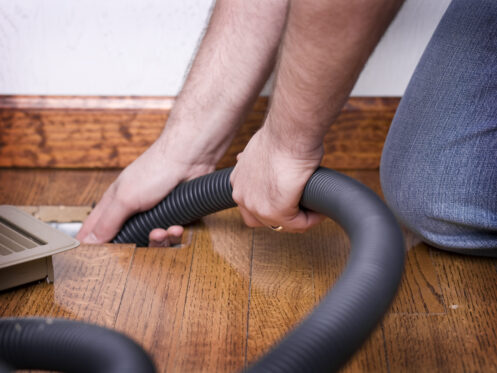Far from being just a nuisance, pests have the potential to do major damage to your home’s HVAC system. If you have mice or other rodents in the home, they will often chew through electrical wiring. Rodents can also chew through flexible ductwork and duct insulation, and they are also prone to nesting in the duct insulation or inside of the air ducts themselves. Squirrels and raccoons that get into the attic can also do lots of damage to the air ducts. Cockroaches and other insects like to live in cool, dark places, which makes air ducts and vents an ideal place for them to nest and hide out.
Mice will also often hide and nest inside outdoor HVAC units like air conditioners and heat pumps and may start damaging the wires and other components. Snakes are also sometimes attracted to the hot environment inside of these units since they are unable to regulate their body temperature. This sometimes leads them to get hit when the fan blades spin, causing major damage to the unit.
Having pests inside your ductwork and other parts of the HVAC system can also be a serious issue in terms of your home’s indoor air quality. Cockroaches, dust mites, and other insects spread lots of allergens and can trigger severe allergies and asthma attacks. Insects and pest droppings also often contain pathogens and can spread harmful diseases. Mice, squirrels, and birds that get inside air ducts will also often become trapped and end up dying, which can lead to nasty odors. All of these issues show why it’s so important to prevent pest infestations and protect your HVAC system from pests, and this article will provide you with some useful tips that will help in this regard.
Watch Out for Signs of Pest Problems
You should always watch out for any signs that indicate your home has a pest problem, such as insects or mice scurrying along the floor or droppings on your floor or counters. When there are pests in your ducts or the attic, you’ll also often be able to hear them moving around. If you do suspect you have a pest infestation, it’s always best to contact a professional exterminator so that you can get rid of all of the pests before they cause serious damage. Simply setting mouse traps or otherwise trying to take care of the pest problem on your own typically won’t be sufficient. Mice are prolific breeders, so you may catch a few, but you typically won’t ever be able to catch all of them, especially if they are nesting in your ductwork.
Make Sure Your Ductwork Is Completely Sealed
The best way to keep pests out of your ductwork is to make sure all of the ducts are completely sealed. It’s also important to have your ductwork inspected regularly to ensure it isn’t damaged and there are no holes or cracks where pests can get inside. This is especially important for preventing mice issues since they can squeeze through extremely small spaces.
Have Your HVAC System Inspected Regularly
Having your entire HVAC system inspected will not only help ensure it doesn’t need repairs, but it is also important for preventing and identifying any pest issues. Especially important is having an HVAC technician clean out debris from the outside unit. Leaves, feathers, and other organic debris make great nesting material, which will often lead to mice making their home in your AC during the cooler months when it is turned off. They’ll also often start chewing through and tearing off pieces of the insulation inside the unit and on the refrigerant lines and adding it to their nests to help them stay warm. If you don’t have all of this material cleaned out, it can result in major damage once you turn the unit back on, causing it to frequently overheat.
Get Your Air Ducts Professionally Cleaned
You should have your air ducts professionally cleaned every few years. Dust, lint, and hair tend to get pulled into the ducts through the return air vents so that debris continually builds up inside the ductwork over time. All of this debris makes the ducts more attractive to pests and creates the perfect breeding ground for mice and other rodents, cockroaches, and dust mites. Having your ducts cleaned is also important for removing any nesting materials or dead pests that may be present since this will negatively impact the air quality in the home.
Keep Your Home and Property Clean
Keeping a clean home always helps, when it comes to preventing pest infestations, since rodents and insects are always attracted to dirty environments. Using trash cans with a lid and sealing up pet food in plastic containers can also help make your home less attractive to mice and rodents.
Cover All Exhaust Vents With Wire Mesh Screens
All of the exhaust vents outside your home make an easy entry point for mice and other pests, so they should be completely covered with a pest-proof wire mesh screen. This includes the exhaust flue for a gas furnace or water heater as well as the dryer vent. Covering the furnace flue is also important for preventing the flue from getting clogged. Birds will occasionally build their nest in this flue over the summer when the furnace isn’t in use. This can partially block the flue so that the furnace isn’t properly vented, which can result in carbon monoxide leaking out into the home.
Seal Up Any Other Potential Entry Points
Making sure that any other gaps or cracks in your home’s structure are completely sealed up will also help to keep pests from getting inside your home. This includes around all pipes in the roof and especially any attic and crawlspace vents since these are the places most prone to pest infestations. You also want to check and make sure that the places where the electrical conduit and refrigerant lines from your air conditioner or heat pump enter the home are completely sealed so that no pests can get in. It’s also important that the soffit panels on your roof eaves are in good shape to keep birds, squirrels, and raccoons out of your attic.
Keep Vegetation Cleared Away From Outdoor HVAC Units
Long grass and lots of weeds and overgrowth make an attractive habitat for rodents and snakes. This is why you should always make sure to keep the area around your AC or heat pump cleared of grass and vegetation. Clearing away all of the vegetation will also improve the unit’s performance and help prevent it from overheating by ensuring it has adequate airflow.
Guarding Your HVAC From Outdoor Critters: Preventive Measures
For ductwork repair, sealing, cleaning, or any HVAC system issues, count on On Time Experts for assistance. We have been providing expert HVAC services to customers in Garland and throughout the Dallas-Fort Worth Metroplex for more than 40 years, and we’re ready to handle all of your heating and air conditioning repair, maintenance, and installation needs.
Give us a call today if you have any questions or need any HVAC, plumbing, or indoor air quality services.

